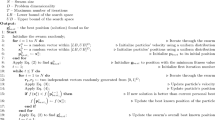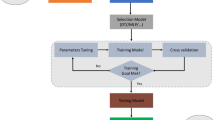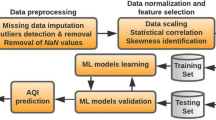Abstract
The process of cost optimization in construction projects entails the systematic reduction of expenses and the maximization of value through the efficient management of resources, cost control, and the attainment of project objectives within the limitations of the budget. This study examines the utilization of different Machine Learning algorithms, such as Linear Regression, Decision Trees, Support Vector Machines (SVM), Gradient Boosting, Random Forest, K-Nearest Neighbors (KNN), Convolutional Neural Network (CNN) Regression, and Particle Swarm Optimization (PSO), in the domain of predictive modeling and cost optimization in the field of construction project management. The primary aims of this study encompass the improvement of cost estimation precision, the identification of pivotal factors that impact project costs, and the implementation of strategies aimed at reducing costs. Evaluation metrics such as Mean Squared Error, Root Mean Squared Error, Mean Absolute Error, and R-squared are commonly employed in the assessment of Machine Learning models' performance. The Voting regression, which leverages the collective predictive power of multiple models, exhibits superior performance in comparison to individual algorithms. Feature selection methods play a crucial role in identifying the variables that have a significant impact on project costs. By employing these methods, organizations can effectively allocate resources and exercise control over costs. Particle Swarm Optimization (PSO) has demonstrated its efficacy in addressing the issue of construction waste reduction and enhancing the accuracy of cost estimation through the identification of optimal combinations of variables. This study emphasizes the importance of Machine Learning and Particle Swarm Optimization (PSO) in the context of predictive modeling and cost optimization within the field of construction project management. The results of this study can provide valuable insights for professionals in the construction industry, aiding them in making informed decisions, allocating resources effectively, achieving project success, and enhancing profitability.





Similar content being viewed by others
References
Akinosho, T. D., Oyedele, L. O., Bilal, M., Ajayi, A. O., Delgado, M. D., Akinade, O. O., & Ahmed, A. A. (2020). Deep learning in the construction industry: a review of present status and future innovations. Journal of Building Engineering, 32, 101827. https://doi.org/10.1016/j.jobe.2020.101827
Al Khazaleh, M., & Bisharah, M. (2023). Ann-based prediction of cone tip resistance with tabu-search optimization for geotechnical engineering applications. Asian Journal of Civil Engineering. https://doi.org/10.1007/s42107-023-00693-3
Ali, Z. H., & Burhan, A. M. (2023). Hybrid machine learning approach for construction cost estimation: an evaluation of extreme gradient boosting model. Asian Journal of Civil Engineering. https://doi.org/10.1007/s42107-023-00651-z
Ali, Z. H., Burhan, A. M., Kassim, M., & Al-Khafaji, Z. (2022). Developing an integrative data intelligence model for construction cost estimation. Complexity, 2022, 1–18. https://doi.org/10.1155/2022/4285328
Alkhdour, A., Khazaleh, M. A., Mnaseer, R. A., Bisharah, M., Alkhadrawi, S., & Al-Bdour, H. (2023). Optimizing soil settlement/consolidation prediction in Finland clays: Machine learning regressions with Bayesian hyperparameter selection. Asian Journal of Civil Engineering. https://doi.org/10.1007/s42107-023-00704-3
Al-Rawashdeh, M., Al Nawaiseh, M., Yousef, I., Bisharah, M., Alkhadrawi, S., & Al-Bdour, H. (2023). Predicting building damage grade by earthquake: A bayesian optimization-based comparative study of machine learning algorithms. Asian Journal of Civil Engineering. https://doi.org/10.1007/s42107-023-00771-6
Alshboul, O., Shehadeh, A., Almasabha, G., & Almuflih, A. S. (2022a). Extreme gradient boosting-based machine learning approach for green building cost prediction. Sustainability, 14(11), 6651.
Alshboul, O., Shehadeh, A., Almasabha, G., Mamlook, R. E. A., & Almuflih, A. S. (2022b). Evaluating the impact of external support on green building construction cost: A hybrid mathematical and machine learning prediction approach. Buildings, 12(8), 1256.
Al-Smadi, S., & Al-Bdour, H. (2023). Machine learning-aided time and cost overrun prediction in construction projects: application of artificial neural network. Asian Journal of Civil Engineering, 1–11.
Arabiat, A., Al-Bdour, H., & Bisharah, M. (2023). Predicting the construction projects time and cost overruns using K-nearest neighbor and artificial neural network: A case study from Jordan. Asian Journal of Civil Engineering. https://doi.org/10.1007/s42107-023-00649-7
Ashtari, M. A., Ansari, R., Hassannayebi, E., & Jeong, J. (2022). Cost overrun risk assessment and prediction in construction projects: A Bayesian network classifier approach. Buildings, 12(10), 1660. https://doi.org/10.3390/buildings12101660
Aung, T., Liana, S. R., Htet, A., & Bhaumik, A. (2023). Using machine learning to predict cost overruns in construction projects. Journal of Technology Innovations and Energy, 2(2), 1–7.
Awada, M., Srour, F. J., & Srour, I. M. (2021). Data-driven machine learning approach to integrate field submittals in project scheduling. Journal of Management in Engineering. https://doi.org/10.1061/(asce)me.1943-5479.0000873
Banerjee Chattapadhyay, D., Putta, J., & Rao, R. M. P. (2021). Risk identification, assessments, and prediction for mega construction projects: A risk prediction paradigm based on cross analytical-machine learning model. Buildings, 11(4), 172. https://doi.org/10.3390/buildings11040172
Bukunova, O., & Bukunov, A. (2020). Information modelling as a tool to manage construction project information flows. IOP Conference Series: Materials Science and Engineering, 753(4), 42030.
Chen, H., Cao, Y., Liu, Y., Qin, Y., & Xia, L. (2023). Enhancing the durability of concrete in severely cold regions: Mix proportion optimization based on machine learning. Construction and Building Materials, 371, 130644.
Cui, B., Fan, C., Munk, J., Mao, N., Xiao, F., Dong, J., & Kuruganti, T. (2019). A hybrid building thermal modeling approach for predicting temperatures in typical, detached, two-story houses. Applied Energy, 236, 101–116. https://doi.org/10.1016/j.apenergy.2018.11.077
Dang-Trinh, N., Duc-Thang, P., Nguyen-Ngoc Cuong, T., & Duc-Hoc, T. (2022). Machine learning models for estimating preliminary factory construction cost: case study in Southern Vietnam. International Journal of Construction Management 1–9.
Darko, A., Glushakova, I., Boateng, E. B., & Chan, A. P. (2023). Using machine learning to improve cost and duration prediction accuracy in green building projects. Journal of Construction Engineering and Management. https://doi.org/10.1061/jcemd4.coeng-13101
Dasović, B., Galić, M., & Klanšek, U. (2020). A survey on integration of optimization and project management tools for sustainable construction scheduling. Sustainability, 12(8), 3405. https://doi.org/10.3390/su12083405
Deepa, G., Niranjana, A. J., & Balu, A. S. (2023). A hybrid machine learning approach for early cost estimation of pile foundations. Journal of Engineering, Design and Technology. https://doi.org/10.1108/JEDT-03-2023-0097
Elbeltagi, E., Ammar, M., Sanad, H., & Kassab, M. (2016). Overall multiobjective optimization of construction projects scheduling using particle swarm. Engineering, Construction and Architectural Management, 23(3), 265–282. https://doi.org/10.1108/ecam-11-2014-0135
ElSahly, O. M., Ahmed, S., & Abdelfatah, A. (2023). Systematic review of the time-cost optimization models in construction management. Sustainability, 15(6), 5578. https://doi.org/10.3390/su15065578
Fedor, B., & Straub, J. (2022). A particle swarm optimization backtracking technique inspired by science-fiction time travel. AI, 3(2), 390–415. https://doi.org/10.3390/ai3020024
Gad, A. G. (2022). Particle swarm optimization algorithm and its applications: A systematic review. Archives of Computational Methods in Engineering, 29(5), 2531–2561. https://doi.org/10.1007/s11831-021-09694-4
Golabchi, H., & Hammad, A. (2023). Estimating labor resource requirements in construction projects using machine learning. Construction Innovation. https://doi.org/10.1108/CI-11-2021-0211
Gulghane, A., Sharma, R. L., & Borkar, P. (2023). Performance analysis of machine learning-based prediction models for residential building construction waste. Asian Journal of Civil Engineering. https://doi.org/10.1007/s42107-023-00708-z
Guo, K., & Zhang, L. (2022). Multi-objective optimization for Improved Project Management: Current status and future directions. Automation in Construction, 139, 104256. https://doi.org/10.1016/j.autcon.2022.104256
Hosny, S., Elsaid, E., & Hosny, H. (2023). Prediction of construction material prices using Arima and multiple regression models. Asian Journal of Civil Engineering, 24(6), 1697–1710. https://doi.org/10.1007/s42107-023-00597-2
Huang, X., & Liang, M. (2022). Visual system development for construction project management by using machine learning algorithm. Optik. https://doi.org/10.1016/j.ijleo.2022.170460
Kaveh, A. (2014). Advances in metaheuristic algorithms for optimal design of structures (pp. 9–40). Springer International Publishing.
Kaveh, A., & Khalegi, A. (1998). Prediction of strength for concrete specimens using artificial neural networks. Advances in engineering computational technology 165–171.
Kaveh, A., Eskandari, A., & Movasat, M. (2023). Buckling resistance prediction of high-strength steel columns using metaheuristic-trained artificial neural networks. Structures, 56(7), 104853.
Kaveh, A., Gholipour, Y., & Rahami, H. (2008). Optimal design of transmission towers using genetic algorithm and neural networks. International Journal of Space Structures, 23(1), 1–19.
Kaveh, A., & Servati, H. (2001). Design of double layer grids using backpropagation neural networks. Computers & Structures, 79(17), 1561–1568.
Kedir, N. S., Somi, S., Fayek, A. R., & Nguyen, P. H. D. (2022). Hybridization of reinforcement learning and agent-based modeling to optimize construction planning and scheduling. Automation in Construction, 142, 104498. https://doi.org/10.1016/j.autcon.2022.104498
Kusonkhum, W., Srinavin, K., & Chaitongrat, T. (2023). The adoption of a machine learning approach in a big data concept to predict project cost budgeting in the Thai auction process of procurement management for a construction project.
Ma, X., Dai, Z., He, Z., Ma, J., Wang, Y., & Wang, Y. (2017). Learning traffic as images: A deep convolutional neural network for large-scale transportation network speed prediction. Sensors, 17(4), 818. https://doi.org/10.3390/s17040818
Marini, F., & Walczak, B. (2015). Particle swarm optimization (PSO). A tutorial. Chemometrics and Intelligent Laboratory Systems, 149, 153–165. https://doi.org/10.1016/j.chemolab.2015.08.020
Mustafa, M. H., Rahim, F. A. M., & Chia, L. K. (2023). The role of 5D building information modelling in construction project cost management: An overview and future directions. Journal of Project Management Practice (JPMP), 3(1), 95–112.
Okereke, R. A., Zakariyau, M., & Eze, E. (2022). The role of construction cost management practices on construction organisations’ strategic performance. Journal of Project Management Practice, 2(1), 20–39. https://doi.org/10.22452/jpmp.vol2no1.2
Pan, Y., & Zhang, L. (2022). Integrating bim and AI for smart construction management: Current status and future directions. Archives of Computational Methods in Engineering, 30(2), 1081–1110. https://doi.org/10.1007/s11831-022-09830-8
Park, U., Kang, Y., Lee, H., & Yun, S. (2022). A stacking heterogeneous ensemble learning method for the prediction of building construction project costs. Applied Sciences, 12(19), 9729.
Parsamehr, M., Perera, U. S., Dodanwala, T. C., Perera, P., & Ruparathna, R. (2022). A review of construction management challenges and BIM-based solutions: Perspectives from the schedule, cost, quality, and safety management. Asian Journal of Civil Engineering, 24(1), 353–389. https://doi.org/10.1007/s42107-022-00501-4
Pham, T. Q. D., Le-Hong, T., & Tran, X. V. (2023). Efficient estimation and optimization of building costs using machine learning. International Journal of Construction Management, 23(5), 909–921.
Pham, V. H. S., & Nguyen, N. L. (2023). Estimating the volume of civil construction materials by machine learning models. Asian Journal of Civil Engineering 1–12.
Sajjad, M., Hu, A., Waqar, A., Falqi, I. I., Alsulamy, S. H., Bageis, A. S., & Alshehri, A. M. (2023). Evaluation of the success of industry 4.0 digitalization practices for sustainable construction management: Chinese construction industry. Buildings, 13(7), 1668. https://doi.org/10.3390/buildings13071668
Sharma, V., Zaki, M., Jha, K. N., & Krishnan, N. A. (2022). Machine learning-aided cost prediction and optimization in construction operations. Engineering, Construction and Architectural Management, 29(3), 1241–1257.
Shoar, S., Chileshe, N., & Edwards, J. D. (2022). Machine learning-aided engineering services’ cost overruns prediction in high-rise residential building projects: Application of random forest regression. Journal of Building Engineering, 50, 104102. https://doi.org/10.1016/j.jobe.2022.104102
ul Hassan, F., Nguyen, T., Le, T., & Le, C. (2023). Automated prioritization of construction project requirements using machine learning and fuzzy failure mode and effects analysis (FMEA). Automation in Construction, 154, 105013.
Uncuoglu, E., Citakoglu, H., Latifoglu, L., Bayram, S., Laman, M., Ilkentapar, M., & Oner, A. A. (2022). Comparison of neural network, gaussian regression, support vector machine, long short-term memory, multi-gene genetic programming, and M5 trees methods for solving civil engineering problems. Applied Soft Computing, 129, 109623. https://doi.org/10.1016/j.asoc.2022.109623
Van, T. N., & Quoc, T. N. (2021). Research trends on machine learning in construction management: A scientometric analysis. Journal of Applied Science and Technology Trends, 2(03), 96–104.
Wang, P., Wang, K., Huang, Y., & Fenn, P. (2023). A contingency approach for time-cost trade-off in construction projects based on machine learning techniques. Engineering, Construction and Architectural Management.
Zhang, N. (2022). Construction cost optimization system based on AHP-BP neural network algorithm. In: The 2021 International Conference on Machine Learning and Big Data Analytics for IoT Security and Privacy: SPIoT-2021 Volume 1 (pp. 121–129). Springer International Publishing.
Zou, Y., Zheng, C., Alzahrani, A. M., Ahmad, W., Ahmad, A., Mohamed, A. M., Khallaf, R., & Elattar, S. (2022). Evaluation of artificial intelligence methods to estimate the compressive strength of geopolymers. Gels, 8(5), 271. https://doi.org/10.3390/gels8050271
Funding
The authors did not receive support from any organization for the submitted work.
Author information
Authors and Affiliations
Contributions
Bader aldeen almahameed and Majdi Bisharah wrote the main manuscript text and prepared all figures . All authors reviewed the manuscript.
Corresponding author
Ethics declarations
Conflict of interest
All authors certify that they have no affiliations with or involvement in any organization or entity with financial interest or non-financial interest in the subject matter or materials discussed in this manuscript.
Additional information
Publisher's Note
Springer Nature remains neutral with regard to jurisdictional claims in published maps and institutional affiliations.
Rights and permissions
Springer Nature or its licensor (e.g. a society or other partner) holds exclusive rights to this article under a publishing agreement with the author(s) or other rightsholder(s); author self-archiving of the accepted manuscript version of this article is solely governed by the terms of such publishing agreement and applicable law.
About this article
Cite this article
almahameed, B.a., Bisharah, M. Applying Machine Learning and Particle Swarm Optimization for predictive modeling and cost optimization in construction project management. Asian J Civ Eng 25, 1281–1294 (2024). https://doi.org/10.1007/s42107-023-00843-7
Received:
Accepted:
Published:
Issue Date:
DOI: https://doi.org/10.1007/s42107-023-00843-7




